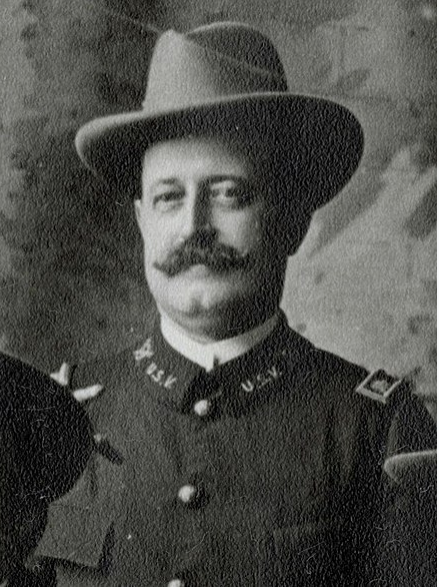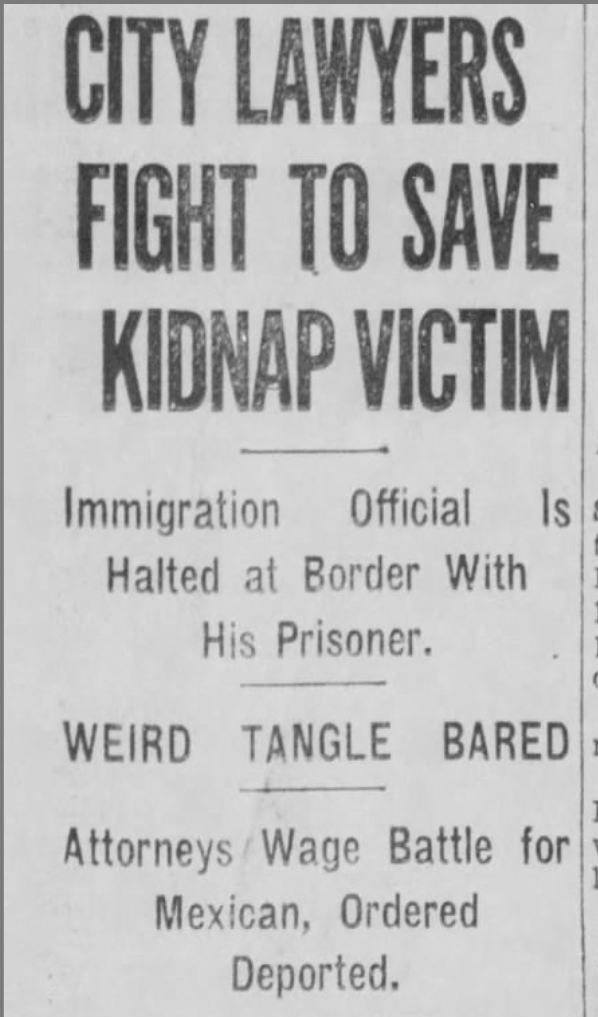
Plan your visit
Russell Harrison’s Last Act as Consul of Mexico, 1931
March 7, 2024

In 2021, when I uncovered the lost history of Indiana’s Mexican consulate, with Russell Harrison appointed as its first (honorary) Vice-Consul in 1907, I thought that I put this topic to rest. The Russell B. Harrison papers are here at the Indiana Historical Society and fall short of any mention of his connection to Mexico or his time as Consul. It was assumed that Russell served as Consul until 1927, when he retired from Indiana politics. However, it turns out that he continued his post as (honorary) Vice-Consul of Mexico in Indianapolis until 1931. From 1927-1930, his post was relatively quiet until his official last act as Consul in 1931, when he brought a kidnapping case of a Mexican National to the Indiana Supreme Court.
1901-1907: Mexico, The Front Door of Latin America, and Indiana’s new Consulate
Both Russell and his father, U.S. President Benjamin Harrison, had a connection with and an interest in Latin America. Throughout the 19th Century there was a decline of European colonial strongholds in the western hemisphere. The Spanish-American War in 1898 was the last of this era, resulting in a peace treaty between Spain and the United States. In the treaty, Spain relinquished its claim to Cuba and provided sovereignty to Guam, the Philippines, and Puerto Rico. Russell Harrison served as a colonel and briefly as the Inspector General of Puerto Rico. A decade before, President Benjamin Harrison convened the first International Conference of American States (countries of North and South America) in Washington D.C, establishing the Pan-American Union in 1890. The goal was to establish a politically and economically unified western hemisphere. This conference reconvened in 1901, now as the Pan-American Conference in Mexico. This location was strategic, as Harrison and his Secretary of State, James Blaine, viewed Mexico as the front door of Latin America.
Six years later in 1907, General Porfirio Diaz, President of Mexico, appointed Col. Russell B. Harrison as an honorary Vice-Consul of Mexico. Russell, like his father, was a practicing lawyer in Indianapolis, and his first law office was in the Newton Claypool building, where he conducted consular business. Later his office would be in the Banker’s Trust Building, also on Ohio Street. After Russell’s retirement from Indiana politics in 1927, he continued to practice law and serve as vice-consul until 1931, per city directory listings.

Russell B. Harrison, Public Domain, Wikimedia Commons
1931: Kidnapping Case Brought to the Indiana Supreme Court
Harrison’s last official act as Consul took place in 1931, during the height of the Mexican Repatriation movement in Indiana. Juan (John) S. Lopez of Indiana Harbor, identified in the newspaper as an “unemployed schoolteacher” and “poverty-stricken laborer”, was arrested in 1930 for running a house of ill repute. John, his wife, and two children arrived in Indiana Harbor in 1928 or 1929 to find work, either as a schoolteacher or mill laborer, which is not clear. The Lopez family opened a boarding house in the Block and Pennsy neighborhood found outside of Inland Steel Company’s gates. The Lopez boarding house also had a pool hall, one of 19 Mexican owned pool halls in Lake County. His arrest was based on the presence of alcohol, which was illegal due to Prohibition. After the stock market crash of 1929, the Great Depression followed as did the Mexican Repatriation movement. By 1932, 34% of Indiana’s Mexican population returned to Mexico. In other parts of the nation, Repatriation looked like turbulent immigration raids with mass deportations without due process. In Indiana, it was quiet, subversive, and systemic. It was mass self-deportations by coercive conditions, directed by state agencies and funded by charitable means.

The Indianapolis Times, July 20, 1931 [cropped]
Per newspaper accounts in 1930, Juan was represented by an unnamed “Porto Rican” (Puerto Rican) lawyer who “made no effort to explain his charges or prepare a defense.” It was said that Juan did not have a full understanding of the charges against him, nor was he informed of the proper process for an appeal. He was tried and convicted by Judge Martin J. Smith of Crown Point. Following his judgement, John sent his petition for an appeal by registered mail to Crown Point. It was received and refused by the clerk, Ms. Alvina M. Killigrew, due to it being sent by mail and not in person. Judge Smith and Immigration Inspector Goodall (Chicago) held a conference call due to Lopez’s legal status while he was in custody. Goodall later apprehended Lopez and immediately took him to the border to be deported as “undesirable.” Indiana Congressman Louis Ludow was asked to interfere, and he took it up with the Department of Commerce and Labor. The matter was then referred to the US Attorney General and Vice-Consul Harrison. Congressman Ludow and the U.S. Assistant Secretary of Commerce (Robe Carl White) halted the deportation at the border and Lopez was returned to Chicago. Harrison and Indianapolis lawyer Milton Clawson filed a writ of coram nobis with the Indiana Supreme Court, requesting the Crown Point court to correct its original judgement due to an error that did not appear in the record of the original judgement proceeding. This case was widely reported in newspapers across the state as a kidnapping. The Indiana Supreme Court issued a writ of mandate order for Judge Martin J. Smith and the clerk, Mrs. Alvina M. Killigrew, to prove why Lopez was not given due process.
The outcome of this case was not found in local newspapers. However, in 1932 Mrs. Killigrew was sued for allegedly pocketing a portion of Lake County’s trust fund upon the end of her term. As for Russell, his intervention in the Lopez case was his last official act, with no further public listings of him as Vice-Consul of Mexico.
The Mexican Consulate would not have a permanent presence in Indianapolis until 2002.








